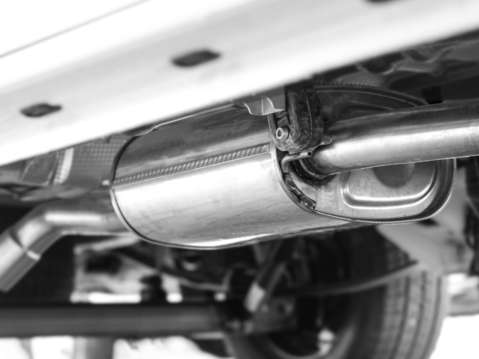How To Protect Your Car from Catalytic Converter Theft
Tips to Deter Thieves and Prevent This Common Type of Car Part Theft
We may all be conscious of preventing our entire car being stolen, but how often have you considered that it may just be valuable parts of your car that thieves are after - is your car protected? Catalytic converter theft has risen alarmingly in recent years and the RAC recently reported that catalytic converter theft costs insurance companies over one thousand pounds on average. It is a serious problem and we’re here to give you the lowdown. In this article we explain why catalytic converters are targeted by criminals and how you can prevent yours from being stolen.
What is a catalytic converter?
It’s no secret that our car’s emissions are harmful, but what you may not know is that catalytic converters are on hand to help cleanse the exhaust using chemical reactions.
Through a combination of carbon monoxide, nitrogen dioxide, nitric oxide and hydrocarbons, the emissions produced by your car are changed into something more palatable to the environment, such as carbon dioxide and water vapour. If you cut open a catalytic converter, you’d see something similar to a honeycomb, which is covered in a substance that works its magic on the gasses your car produces.
Your catalytic converter is something that operates in the background on your behalf, and unless something goes wrong with it, or, as we’ll discuss, someone decides to steal it, you usually won’t even have to acknowledge it.
Why are catalytic converters targeted by thieves?
In order to produce catalytic converters that do their job properly, precious metals like palladium, rhodium and platinum are used, which is what makes these important parts valuable when scrapped - and therefore pretty sought after by thieves. Older vehicles tend to be more at risk, as a larger quantity of precious metals were used in the production of catalytic converters in years gone by.
Catalytic converters work best when they’re positioned within the car in a way that keeps them away from the engine - so naturally they’re towards the back of the car, and therefore they’re more accessible; no bonnet lifting required.
Due to their vulnerable position, thieves are able to cut the part from the system, and this accessibility has caused a rise in crime that leaves drivers seriously inconvenienced.
How much is a catalytic converter worth?
Something of a catalytic converter black market has expanded alongside the rise in thefts, and they can generally sell for around £150. However, a replacement catalytic converter can cost the targeted motorist anywhere from £150 to over £1,000, depending on the make and model of the car.
How can you prevent your catalytic converter from being stolen?
Know your serial number
If it doesn’t already have one, you can have a service centre mark your catalytic converter to make it traceable. The Scrap Metal Dealers Act stipulates that anyone scrapping a catalytic converter must first verify the identity of the seller before handing over cash.
A sticker on the window of your car that makes it clear to thieves that the catalytic converter is identifiable may also put them off.
Buy a catalytic converter cover
Investing in a device that makes it harder for thieves to prize your catalytic converter away from your vehicle could save you a lot of expense and hassle. Locks and guards are available for this very purpose, but make sure you declare any of these security measures to your vehicle’s insurance provider.
Choose your parking space carefully
Where possible, park in well-lit areas, as thieves don’t generally like the spotlight! As the underneath of your car is where your converter is located, make this area of your vehicle as difficult to reach as possible. Get to know where your catalytic converter is underneath your car, and park this side next to fences, walls or high kerbs where possible.
Avoid parking up on kerbs on two wheels too!
Invest in home security cameras
From doorbells with cameras to full home CCTV systems, a beady eye on your off-street parking will put your mind at rest, and hopefully deter thieves. If they are brazen enough to operate under scrutiny, you’ll have something to submit to the Police to increase the chances of the perpetrators being caught.
Remain vigilant
Report any suspicious activity to the Police, and incorporate your catalytic converter into your personal and domestic security considerations.
What should you do if your catalytic converter is stolen?
Generally, a much louder exhaust than usual will alert you to catalytic converter theft, and if this is indeed the case, you shouldn’t drive your car. You should contact the Police with all the information you have (including any of that handy security footage) and your insurance provider to explore repair options.



